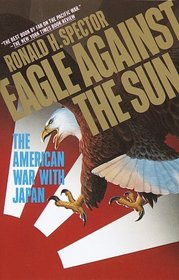This is a closely written, succinct history of the Pacific Theater of Operations. I obtained it as one of three add-ons to the wish listed book kindly supplied by a PBS comrade and will take it to the book truck in the lobby of the VA Hospital where it is sure to find an interested reader within an hour or two.
Mr. Spector acknowledges that his book benefits from the release of formerly classified documents. The lengthy time since VJ Day makes it easier for the author to take critical stands in some cases, especially about General MacArthur. Offering a couple of examples of other commanders who made wrong decisions, he then writes, "MacArthur stands alone in his refusal to confront or even acknowledge the consequences of his actions."
There are a few illustrations, endnotes with each chapter, index, and bibliographical notes. The last are sometimes more than mere citations--the author shares his opinion of the value of the source. For example, "While the memoirs of the top commanders provide some useful information, none are as enlightening--or interesting--as those by men who occupied less exalted positions."
"The Pacific War was in many respects a war of attrition. After the recent conflict in was in many respects a war of attrition. After the recent conflict in Vietnam, it has become almost a tautology to say that the U.S. cannot win a war of attrition. Yet this was essentially the knd of war the U.S. waged against Japan after mid-1942. Following the Battle of Midway, United States forces did not confront a major Japanese fleet until mid-1944. They did not engage even a medium-size Japanese army until the end of 1944. Yet by that time Japan had been effectively defeated. Her supply lines had been severed by American submarines, her air power had been dissipated in costly air battles over the Solomons and New Guinea, Rabaul and Truk; and her cruiser and destroyer forces had been worn down in countless night clashes in the Solomons. That war of attrition--and the even more deadly attrition--and the even more deadly attrition by submarines and heavy bombing in 1944-45--finally spelled Japan's defeat."
Mr. Spector acknowledges that his book benefits from the release of formerly classified documents. The lengthy time since VJ Day makes it easier for the author to take critical stands in some cases, especially about General MacArthur. Offering a couple of examples of other commanders who made wrong decisions, he then writes, "MacArthur stands alone in his refusal to confront or even acknowledge the consequences of his actions."
There are a few illustrations, endnotes with each chapter, index, and bibliographical notes. The last are sometimes more than mere citations--the author shares his opinion of the value of the source. For example, "While the memoirs of the top commanders provide some useful information, none are as enlightening--or interesting--as those by men who occupied less exalted positions."
"The Pacific War was in many respects a war of attrition. After the recent conflict in was in many respects a war of attrition. After the recent conflict in Vietnam, it has become almost a tautology to say that the U.S. cannot win a war of attrition. Yet this was essentially the knd of war the U.S. waged against Japan after mid-1942. Following the Battle of Midway, United States forces did not confront a major Japanese fleet until mid-1944. They did not engage even a medium-size Japanese army until the end of 1944. Yet by that time Japan had been effectively defeated. Her supply lines had been severed by American submarines, her air power had been dissipated in costly air battles over the Solomons and New Guinea, Rabaul and Truk; and her cruiser and destroyer forces had been worn down in countless night clashes in the Solomons. That war of attrition--and the even more deadly attrition--and the even more deadly attrition by submarines and heavy bombing in 1944-45--finally spelled Japan's defeat."




